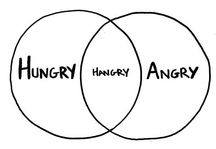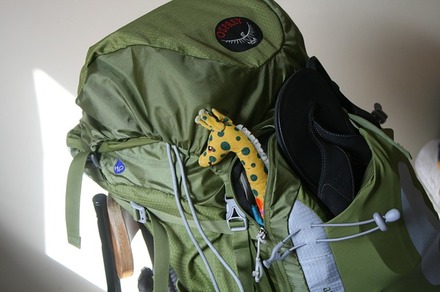Yesterday, to celebrate Emergency Preparedness Week, we started the conversation around Bug Out Bags, or BOBs. Useful in any emergency situation, they are as unique and special as you are. We continue today with a few more suggestions for the categories of items you might want to consider including in your BOB.
PERSONAL COMFORT
Having a few nice things can go a long way in managing your mental health. Items might include a toothbrush and toothpaste, deodorant, or a nice pair of comfy socks. Photos of friends and loved ones can help keep feelings of isolation at bay, and don't take up too much room.
PERSONAL COMFORT
Having a few nice things can go a long way in managing your mental health. Items might include a toothbrush and toothpaste, deodorant, or a nice pair of comfy socks. Photos of friends and loved ones can help keep feelings of isolation at bay, and don't take up too much room.
 This can be deadly in the apocalypse.
This can be deadly in the apocalypse. If you're the type to get h-angry, then maybe you should include a few more protein bars in your pack. Smokers, toss in a vaporiser or cigarettes to keep your discomfort at bay as well. Add in a few sources of entertainment; a pack of cards or sudoku can go a long way as you sit in the dark waiting for the horde of zombies to disperse. Consider those you might be traveling with; if you're packing BOBs for your kids, add a few toys to keep them entertained.
NAVIGATION AND SIGNALING
Nothing like an EMP or solar flare to ruin your GPS. Having some basic navigational tools can be really helpful; a navigational compass and a map of your city or region can do wonders for your sanity. Word to the wise: make sure you know how to use the tools before Z-Day ever happens. There's nothing like being chased by zombies through back alleys as you run with a map unfolded in front of you. Signalling devices like flares, whistles, lights, or mirrors could come in handy depending on your bug out plans. Tossing in a permanent marker and some paper can help mark "Do Not Enter: Zombies Inside" on any over-run buildings.
BARTER ITEMS/CURRENCY
Depending on the extent of the emergency, our economy might collapse pretty quickly. In the meantime, it's nice to have a few items to trade with other folks, be it on the street or between the rows of cots in an evacuation centre. Some of our members pack instant coffee packets, cigarettes, extra lighters, or extra comfort items like toothbrushes to use as barter. Buttons and sewings kits take up a little room, but could be important further down the line. You might also want to pack some cash or an extra credit card in the case the whole system hasn't gone down. A low-interest credit card helped a few of us when we were evacuated from our homes in the flood; being able to pay for hotel rooms or buy new damn dress pants made things a little easier.
OTHER EQUIPMENT
From a pocket knife to a compact cook stove, feel free to include whatever else you might want to make your travels easier. Rope and paracord come in handy regardless of the type of emergency, and tarps can be fashioned into shelter or used to collect rain water. Tools are heavy, so try to pack multi-use items if you can. If you plan on bugging out with someone else, try to spread the equipment around; there's no sense in two of you carrying around cook stoves and fuel. Just make sure to field test your equipment first so you know how to use it and you know you can trust it!
SELF DEFENCE
In a zombie apocalypse, it will be essential to arm yourself against the hordes of the undead. In a flood, it might not be such an important thing. Keep in mind that if you look dangerous, you will be treated as dangerous by authorities and other survivors. If you have a weapon of choice, make sure you practice using it! We're big fans of self defence training and improvising on the go!
LASTLY: PICK YOUR PACK!
We cannot reiterate how important it is that you don't overpack your BOB. You must be able to carry it comfortably and for great distances. Make sure your bag fits properly, both in terms of torso length and waist support. We're told that a good backpack should transfer 80% of the weight to your waist, so having a good hip belt can dramatically affect how long you can carry your bag. Frames, sternum straps, number of pockets; these are all up to your personal choice. Some of our members like the military-style bags, and others prefer to remain more incognito with an tired looking backpack. We definitely recommend that no matter what, you spend some time carrying your pack. From 15 minutes a day on the treadmill to taking a leisurely walk around Fish Creek, do whatever you need to condition yourself!
That's it for now! Do you have any other recommendations for your fellow survivors?
NAVIGATION AND SIGNALING
Nothing like an EMP or solar flare to ruin your GPS. Having some basic navigational tools can be really helpful; a navigational compass and a map of your city or region can do wonders for your sanity. Word to the wise: make sure you know how to use the tools before Z-Day ever happens. There's nothing like being chased by zombies through back alleys as you run with a map unfolded in front of you. Signalling devices like flares, whistles, lights, or mirrors could come in handy depending on your bug out plans. Tossing in a permanent marker and some paper can help mark "Do Not Enter: Zombies Inside" on any over-run buildings.
BARTER ITEMS/CURRENCY
Depending on the extent of the emergency, our economy might collapse pretty quickly. In the meantime, it's nice to have a few items to trade with other folks, be it on the street or between the rows of cots in an evacuation centre. Some of our members pack instant coffee packets, cigarettes, extra lighters, or extra comfort items like toothbrushes to use as barter. Buttons and sewings kits take up a little room, but could be important further down the line. You might also want to pack some cash or an extra credit card in the case the whole system hasn't gone down. A low-interest credit card helped a few of us when we were evacuated from our homes in the flood; being able to pay for hotel rooms or buy new damn dress pants made things a little easier.
OTHER EQUIPMENT
From a pocket knife to a compact cook stove, feel free to include whatever else you might want to make your travels easier. Rope and paracord come in handy regardless of the type of emergency, and tarps can be fashioned into shelter or used to collect rain water. Tools are heavy, so try to pack multi-use items if you can. If you plan on bugging out with someone else, try to spread the equipment around; there's no sense in two of you carrying around cook stoves and fuel. Just make sure to field test your equipment first so you know how to use it and you know you can trust it!
SELF DEFENCE
In a zombie apocalypse, it will be essential to arm yourself against the hordes of the undead. In a flood, it might not be such an important thing. Keep in mind that if you look dangerous, you will be treated as dangerous by authorities and other survivors. If you have a weapon of choice, make sure you practice using it! We're big fans of self defence training and improvising on the go!
LASTLY: PICK YOUR PACK!
We cannot reiterate how important it is that you don't overpack your BOB. You must be able to carry it comfortably and for great distances. Make sure your bag fits properly, both in terms of torso length and waist support. We're told that a good backpack should transfer 80% of the weight to your waist, so having a good hip belt can dramatically affect how long you can carry your bag. Frames, sternum straps, number of pockets; these are all up to your personal choice. Some of our members like the military-style bags, and others prefer to remain more incognito with an tired looking backpack. We definitely recommend that no matter what, you spend some time carrying your pack. From 15 minutes a day on the treadmill to taking a leisurely walk around Fish Creek, do whatever you need to condition yourself!
That's it for now! Do you have any other recommendations for your fellow survivors?

 RSS Feed
RSS Feed
